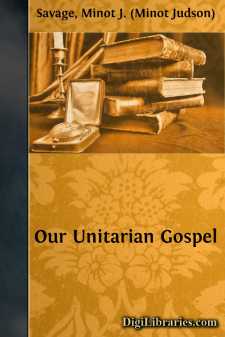Categories
- Antiques & Collectibles 13
- Architecture 36
- Art 48
- Bibles 22
- Biography & Autobiography 813
- Body, Mind & Spirit 142
- Business & Economics 28
- Children's Books 17
- Children's Fiction 14
- Computers 4
- Cooking 94
- Crafts & Hobbies 4
- Drama 346
- Education 46
- Family & Relationships 57
- Fiction 11829
- Games 19
- Gardening 17
- Health & Fitness 34
- History 1377
- House & Home 1
- Humor 147
- Juvenile Fiction 1873
- Juvenile Nonfiction 202
- Language Arts & Disciplines 88
- Law 16
- Literary Collections 686
- Literary Criticism 179
- Mathematics 13
- Medical 41
- Music 40
- Nature 179
- Non-Classifiable 1768
- Performing Arts 7
- Periodicals 1453
- Philosophy 64
- Photography 2
- Poetry 896
- Political Science 203
- Psychology 42
- Reference 154
- Religion 513
- Science 126
- Self-Help 84
- Social Science 81
- Sports & Recreation 34
- Study Aids 3
- Technology & Engineering 59
- Transportation 23
- Travel 463
- True Crime 29
Our Unitarian Gospel
Description:
Excerpt
UNITARIANISM.
THROUGH the lack of having made themselves familiar with the matter, there is a common and, I think, a widespread impression among people generally that Unitarianism is a new-fangled notion, a modern fad, a belief held only by a few, who are one side of the main currents of religious life and advance.
Even if it were new, even if it were confined to the modern world, this would not necessarily be anything against it. The Copernican theory of the universe is new, is modern. So are most of the great discoveries that characterize and glorify the present age.
But in the case of Unitarianism this cannot be said. It is not new: it is very old. And, before I come to discuss and outline a few of its great principles, it seems to me well that we should get in our minds a background of historic thought, that we may see a little what are the sources and origins of this Unitarianism, and may understand why it is that there is a new and modern birth of it in the modern world.
All races start very far away from any Monotheistic or Unitarian belief. The Hebrews are no exception to that rule. The early part of the Bible shows very plain traces of the fact that the Jews were polytheists and nature-worshippers. If I should translate literally the first verse of the Bible, it would read in this way: In the beginning the Strong Ones created the heavens and the earth. "The word that we have translated God is in the plural; and I have already given you its meaning. This is only a survival, a trace, of that primeval belief which the Jews shared with all the rest of the world."
From this polytheistic position the people took a step forward to a state of mind which Professor Max Muller calls henotheism; that is, they believed in the real existence of many gods, but that they were under allegiance to only one, their national Deity, and that him only they must serve.
I suppose this state of thought was maintained throughout the larger part of the history of the Hebrew nation. You will find traces constantly, in the early part of the Old Testament, at any rate, of the belief of the people in the other gods, and their constant tendency to fall away to the worship of these other gods. But by and by all this was outgrown, and left behind; and the Hebrew people came to occupy a position of monotheism, spiritual monotheism, that is, they were passionate Unitarians, so far as the meaning of that word is concerned. Though, of course, I would not have you understand that many, perhaps most, of the principles which are held today under the name of Unitarian were known to them at that time, or would have been accepted, had they been known.
In the sense, however, of believing in the oneness of God, they were
Unitarians.
Now, when Christianity comes into the world, what shall we say? It is the assumption on the part of most of the old- time churches that Jesus made it perfectly plain to his disciples that he was a divine being, that he claimed to be one himself, and that the claim was recognized....


